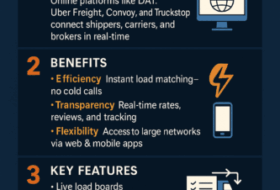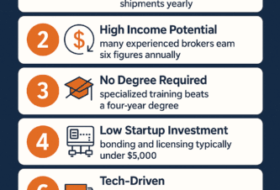Are you considering a career as a freight broker?
Freight brokers play a crucial role in the transportation industry, acting as intermediaries between shippers and carriers to facilitate the movement of goods. As with any profession, compensation varies based on several factors. Here’s an in-depth look at freight broker salaries.
1. Average Salary for Freight Brokers
The average salary for freight brokers ranges between $40,000 and $90,000 per year. However, it’s important to note that salaries can vary significantly based on experience, location, company size, and industry specialization. Established brokers with extensive networks and years of experience can earn six-figure incomes, while those new to the field may start at a lower salary level.
2. Factors Affecting Freight Broker Salaries
Several factors influence the earning potential of freight brokers. Let’s explore the key factors that can impact their salaries:
a) Experience: The more experience a freight broker has, the higher their earning potential. Experienced brokers have a deep understanding of the industry, established relationships with carriers and shippers, and the ability to negotiate favorable rates.
b) Geographic Location: Salaries can vary significantly depending on the geographic location. Brokers working in major transportation hubs or densely populated areas with high shipping volumes may earn higher salaries due to increased demand.
c) Company Size: The size and reputation of the brokerage firm can impact salaries. Larger companies may offer higher base salaries and additional benefits, such as commissions and performance bonuses.
d) Industry Specialization: Some freight brokers specialize in specific industries, such as automotive, retail, or healthcare. Specialized brokers often earn higher salaries due to their expertise and ability to provide tailored services to clients.
e) Commission Structure: Freight brokers typically earn commissions based on the value of the shipments they handle. Commission rates can vary from company to company, and brokers with excellent negotiation skills can command higher commission rates.
3. Career Progression and Advancement
Freight brokering offers opportunities for career progression and advancement. As brokers gain experience and build a solid reputation, they can expand their client base, negotiate higher rates, and increase their earning potential. Many brokers also choose to start their own brokerage firms, allowing them to take control of their income and potentially earn substantial profits.
4. Frequently Asked Questions (FAQs)
a) Q: What education or qualifications are required to become a freight broker? A: While there are no specific educational requirements, a high school diploma or equivalent is generally the minimum. However, pursuing relevant certifications, such as the Transportation Intermediaries Association’s Certified Transportation Broker (CTB) designation, can enhance credibility and job prospects.
b) Q: Is prior industry experience necessary to become a freight broker? A: While prior industry experience can be beneficial, it is not always required. Many successful freight brokers enter the profession without previous experience but acquire the necessary skills through training programs and on-the-job learning.
c) Q: How can I increase my chances of earning a higher salary as a freight broker? A: To increase your earning potential, focus on building a strong network of carriers and shippers, honing your negotiation skills, and developing expertise in a specific industry. Continuously expanding your knowledge and staying updated with industry trends can also contribute to career growth.
d) Q: Are there opportunities for remote work as a freight broker? A: Yes, remote work opportunities are available in the freight brokerage industry. Advancements in technology and digital platforms have made it possible for brokers to operate from anywhere with an internet connection. However, some brokers prefer to work in a physical office environment.
e) Q: What is the career outlook for freight brokers? A: The demand for freight brokers is expected to grow in the coming years due to the increasing complexity of supply chains and the need for efficient transportation solutions. This positive outlook indicates a favorable environment for career growth and potential salary increases.
f) Q: How can I start my own freight brokerage firm? A: Starting your own brokerage firm requires careful planning, industry knowledge, and obtaining the necessary licenses and permits. Consider gaining experience in the industry, establishing a strong network, and consulting with industry professionals or business advisors to navigate the process successfully.
Understanding freight broker salary information is essential for anyone considering a career in this industry. While salaries can vary based on experience, location, and other factors, freight brokering offers potential for career growth and advancement. By building expertise, expanding networks, and staying abreast of industry developments, aspiring freight brokers can increase their earning potential and create a fulfilling career in this dynamic field.
Growth + Change = Opportunity! How are you going to capitalize on the opportunity as a freight broker, agent, dispatcher or box truck carrier?








